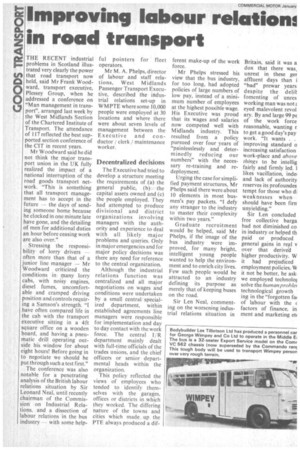Improving labour relation!
Page 22

If you've noticed an error in this article please click here to report it so we can fix it.
in road transport
THE RECENT industrial problems in Scotland illustrated very clearly the power that road transport now held, said Mr Frank Woodward, transport executive, Plessey Group, when he addressed a conference on "Man management in transport", arranged last week by the West Midlands Section of the Chartered Institute of Transport. The attendance of I 17 reflected the best supported section conference of the CIT in recent years.
Mr Woodward said he did not think the major transport union in the UK fully realized the impact of a national interruption of the road goods transport network. "This is something that all transport management has to accept in the future the days of sending someone home because he clocked in one minute late have gone, and the detailing of men for additional duties an hour before ceasing work are also over."
Stressing the responsibility of lorry drivers — often more than that of a junior line manager — Mr Woodward criticized the conditions in many lorry cabs, with noisy engines, diesel fumes, uncomfortable and cramped driving position and controls requiring a Samson's strength. "I have often compared life in the cab with the transport executive sitting in a 4 ft square office on a wooden board, and having a pneumatic drill operating outside his window for about eight hours! Before going in to negotiate we should be put through such a test first."
The conference was also notable for a penetrating analysis of the British labour relations situation by Sir Leonard Neal, until recently chairman of the Commission on Industrial Relations. and a dissection of labour relations in the bus industry with some help ful pointers for fleet operators.
Mr M. A. Phelps, director of labour and staff relations, West Midlands Passenger Transport Executive, described the industrial relations set-up in WM PTE where some 10,000 people were employed at 30 locations and where there were about seven levels of management between the Executive and conductor / clerk! maintenance worker.
Decentralized decisions
The Executive had tried to develop a structure meeting the requirements of (a) the general public, (b) the capital assets owned and (c) the people employed. They had attempted to produce divisional and district organizations involving managers with the authority and experience to deal with all likely major problems and queries. Only in major emergencies and for major policy decisions was there any need for reference to the central organization.
Although the industrial relations function was centralized and all major negotiations on wages and conditions were undertaken by a small central specialized department, within established agreements line managers were responsible for implementation and day to day contact with the work force. The central I/R department mainly dealt with full-time officials of the trades unions, and the chief officers or senior departmental heads within the organization.
This policy reflected the views of employees who tended to identify themselves with the garages, offices or districts in which they worked. The differing nature of the towns and cities which made up the PTE always produced a dif ferent make-up of the work force.
Mr Phelps stressed his view that the bus industry, for too long, had adopted policies of large numbers of low pay, instead of a minimum number of employees at the highest possible wage. His Executive was proud that its wages and• salaries now competed well with Midlands industry. This resulted from a policy pursued over four years of "painiesslessly and determinedly reducing our numbers" with the necessary re-training and redeployment.
Urging the case for simplified payment structures, Mr Phelps said there were about 10 elements in most busmen's pay packets. "I defy any stranger to the industry to master their complexity within two years."
Graduate recruitment would be helped, said Mr Phelps, if the image of the bus industry were improved, for many bright, intelligent young people wanted to help the environment and to enrich city lives. Few such people would be attracted to an industry defining its purpose as merely that of keeping buses on the road.
Sir Len Neal, commenting on the worsening industrial relations situation in Britain, said it was a dox that there was unrest in these ger affluent days than i "bad" prewar years despite the delit fomenting of unres working man was not E eyed malevolent revol ary. By and large 99 pc of the work force reasonable, wanting r to get a good day's pay work. "It wants . . improving standard o increasing satisfaction work-place and above things to be intellig fairly and firmly led. 1 likes vacillation, indel and lack of authority reserves its profoundes tempt for those who di weaknesses when should have been firrr unyielding."
Sir Len concluded free collective barga had not diminished co in industry or helped th paid or produced general gains in real v over that derivet1 higher productivity. W it had prejudiced employment policies. W it not be better, he ask, we employed technolol solve the human problet technological growth ing in the "forgotten fai of labour with the c factors of finance, in ment and marketing et
























































































































